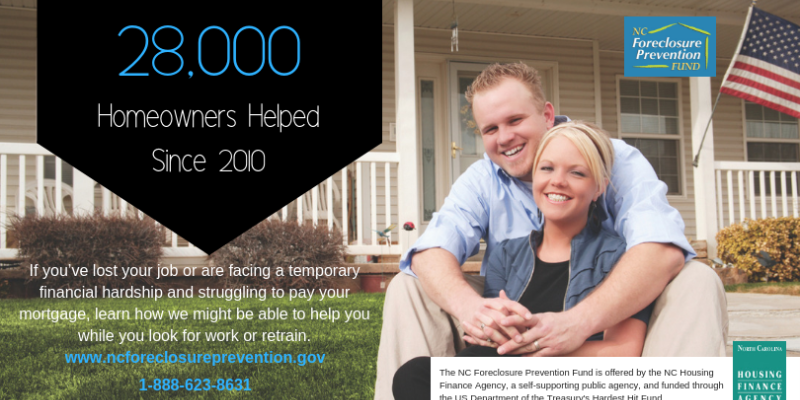
More than 28,000 North Carolinians have held on to their homes during hard times thanks to a statewide effort that not only prevented foreclosures for those families, but preserved more than $5 billion in property value for communities statewide. The NC Foreclosure Prevention Fund, administered by the NC Housing Finance Agency and funded by the US Department of the Treasury’s Hardest Hit Fund, offers mortgage payment assistance to help North Carolina homeowners keep their homes while they recover from a temporary financial hardship.
“Foreclosure doesn’t just impact homeowners, it affects the whole state,” said Scott Farmer, executive director of the NC Housing Finance Agency. “Foreclosures can lower property values, disrupt the state’s economy and impact job creation.”
Created in 2010 during the Great Recession, the NC Foreclosure Prevention Fund helps qualified homeowners struggling to pay their mortgage due to a no-fault job loss, furlough or temporary hardship, such as illness, death of a spouse or natural disaster. The Fund also assists military veterans transitioning to a civilian career. Assistance is provided as a zero-interest, deferred, forgivable loan up to $36,000 for 18 months to cover mortgage and related expenses while the homeowner looks for work or completes job training. Furloughed military or civilian applicants, including those entitled to backpay or qualified for unemployment benefits, may be eligible for “stop and go” monthly payment assistance after no pay for two consecutive weeks. Applicants can receive up to 18 months of assistance.
Assistance is also available for homeowners re-employed after a job loss or other eligible hardship but earning less than before and unable to make mortgage payments as a result. A forgivable, no-interest, deferred loan reduces the principal loan balance so mortgage payments are more affordable. This assistance is also available for homeowners who have transitioned to a fixed income after a job loss or other qualified hardship.
“A temporary setback doesn’t have to be a permanent loss,” Farmer said. “We can help keep North Carolinians in their homes to benefit the economy and provide a better future for all North Carolina citizens.”
Homeowners needing assistance are encouraged to act quickly since funding is limited.
The North Carolina Housing Finance Agency, a self-supporting public agency, has financed 282,000 homes and apartments since its creation in 1973.
###